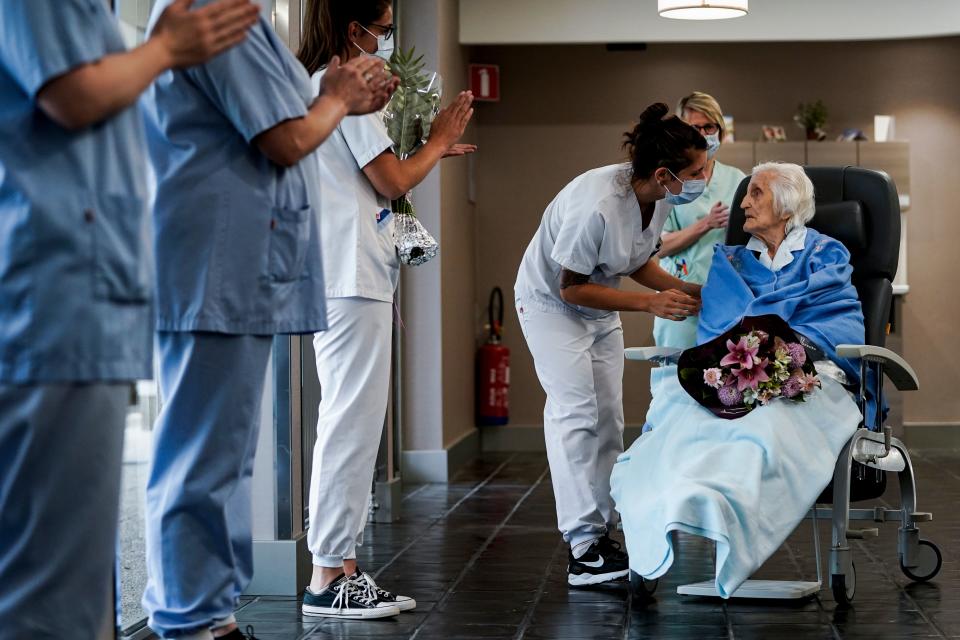Coronavirus: ‘Excess fatalities’ occurring even in people without COVID-19 on death certificate

An “excess” in fatalities is occurring among people without COVID-19 mentioned on their death certificate, statistics have revealed.
Amid the coronavirus outbreak, more than twice as many people have died in England and Wales than is expected for this time of year.
On the week ending 17 April, the Office for National Statistics (ONS) recorded 22,351 deaths, an excess of more than 12,000 compared to the average.
Of these “additional” deaths, just under three-quarters (73%) mentioned COVID-19 on the death certificate. COVID-19 is a respiratory disease that can be triggered by the coronavirus.
The remaining 27% had no mention of COVID-19 on the official document.
Experts have suggested the outbreak is putting people off going to hospital, with one calling it a “real phenomenon”.

Rise in non-COVID 19 deaths a ‘real phenomenon’
When combining data from the past six weeks, just over 27,000 excess deaths have occurred in England and Wales.
Of these, around 19,000 were linked to COVID-19, while the remaining 7,916 (29%) are thought to have been unrelated to it.
Latest coronavirus news, updates and advice
Live: Follow all the latest updates from the UK and around the world
Fact-checker: The number of COVID-19 cases in your local area
Explained: Symptoms, latest advice and how it compares to the flu
Scientists from the Centre for Evidence-Based Medicine at the University of Oxford have put this down to either “underreporting” of COVID-19 on the death certificate or fatalities “from other causes going up”.
The centre’s Professor Carl Heneghan doubts underreporting is the issue, however.
“COVID is in the psyche of everyone,” he said at a Science Media Centre briefing.
“Anyone with a fever or cough [the tell-tale symptoms] will be labelled on a death certificate as COVID.
“[The] trend up [in non-COVID deaths] is a real phenomenon in some way.”
Professor Sir David Spiegelhalter from the University of Cambridge said he was “not willing yet” to speculate.
He added, however, he would have expected the number of non-COVID fatalities to decline over time as “people became more willing to list it on the death certificate”.

‘Hospitals are perceived as dangerous places’
Government officials have expressed concern that fewer people are using the NHS, for example if they have a heart attack, out of fear of catching the coronavirus.
“Hospital admissions are hugely down,” said Spiegelhalter.
“[There has been an] enormous drop in A&E attendance.”
On the week ending 17 April, the total number of combined deaths at home and in care homes was greater than those in hospital.
Of the 4,570 people who died at home that week, 91% did not have COVID-19 on their death certificate.
Just under three-quarters (72%) of the care-home deaths were also deemed unrelated to COVID-19.
In comparison, 35% of the deaths in hospitals that week did not have COVID-19 mentioned on the certificate.
Care operators have said they are at the centre of the crisis, with more than 4,300 fatalities in a fortnight in England and Wales.
When it comes to the number of non-COVID fatalities, Spiegelhalter said: “Care home deaths are being [recorded] without testing the patient [for the coronavirus].
“Registering doctors often will not have seen the patient recently [due to the lockdown].
“[They are] relying quite strongly on what the care home is saying to make the death registration.”
Professor Heneghan added: “I would not think in the current climate by week 16 [of 2020] all [the excess non-COVID deaths are] down to underreporting.”
The most logical explanation seems to be people avoiding hospital despite needing life-saving care.
“Hospitals are perceived as dangerous places,” said Spiegelhalter.
“[There is a] reluctance of people to go for routine appointments or because they are [afraid of] encountering [coronavirus] symptoms.”
To better understand what is at play, the experts have called for more thorough information on the excess fatalities.
“We need an urgent break down [from ONS] of other causes driving this excess death,” said Professor Heneghan.
“What is needed is an enquiry from the death certificate, medical notes [and] coroner reports to ascertain the deaths.
“It’s a big research project, but warranted in this situation to really understand what’s happened and learn [from it] if we end up in a situation like this again.”

What is the coronavirus?
The coronavirus is one of seven strains of a virus class that are known to infect humans.
Others cause everything from the common cold to severe acute respiratory syndrome (Sars), which killed 774 people during its 2002/3 outbreak.
Since the coronavirus outbreak was identified, more than 3.1 million cases have been confirmed worldwide, according to Johns Hopkins University.
Of these cases, over 935,600 are known to have “recovered”.
Globally, the death toll has exceeded 217,500.
The coronavirus mainly spreads face to face via infected droplets expelled in a cough or sneeze.
There is also evidence it is transmitted in faeces and can survive on surfaces.
Symptoms include fever, cough and slight breathlessness.
The coronavirus has no “set” treatment, with most patients naturally fighting off the infection.
Those requiring hospitalisation are given “supportive care”, like ventilation, while their immune system gets to work.
Officials urge people to ward off the coronavirus by washing their hands regularly and maintaining social distancing.




